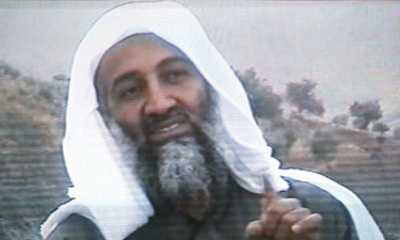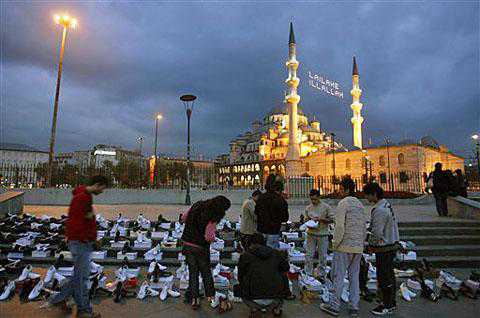Sunday, 13 July 2008, 2:54 pm
Column: Ramzy Baroud
A Kodak Moment:
The Not-So-Historic Talabani-Barak Handshake (Photo: AFP)
By Ramzy Baroud
Most people would not have even realised that the 23rd congress of the Socialist International was being held near Athens were it not for the moment when Israeli Defence Minister Ehud Barak shook the hand of Iraqi President Jalal Talabani.
An Associated Press report, published in the Israeli daily Haaretz, dubbed the handshake “historic”. History was supposedly made in Athens on 1 July 2008. Centred in a photo, featuring a widely grinning Barak and Talabani, is Palestinian Authority President Mahmoud Abbas, who was credited for introducing the two.
The three individuals involved are members of political establishments that are largely funded and sustained by the US government. Both Abbas and Talabani are at the helm of puppet political structures that lack sovereignty or political will of their own, and are entirely reliant on scripts drafted in full or in part by the Bush administration.
As for Israel, which enjoys a more equitable relationship with the United States, normalisation with the Arabs is something it covets and tirelessly promotes, granted that such normalisation doesn’t involve ending its occupation of the Palestinian territories, or any other concessions.
One might suggest the happenstance handshake and very brief meeting was not accidental at all. This is what Haaretz wrote, rewording Barak’s comments on the handshake. He “said that Israel wished to extend its indirect peace talks with Syria to cover Iraq as well.” That was a major political declaration by Israel — one surely aimed at further isolating Iran, as Israel’s newest moves regarding Syria, Lebanon and Gaza clearly suggest. But the fact is Israel’s ever-careful leaders could make no such major political announcement without intense deliberation and consensus in the Israeli government prior to the “accidental” handshake.
Talabani owes Barak more than a reciprocal handshake; a heartfelt thank you is in order for his newly found fortunes as Iraq’s sixth president starting in 2005. Indeed, over time, pointing the finger at Israel’s leading role in the Iraq war — as it’s now being replayed in efforts to strike Iran — has morphed from being a recurring discussion of writers and analysts outside the mainstream media, to US government and army officials.
In a recent commentary, US writer Paul J Balles brings to the fore some of these major declarations, including those of Senator Ernest Hollings (May 2004) who “acknowledged that the US invaded Iraq ‘to secure Israel’, and ‘everybody knows it.’” Retired four-star US army general and former NATO Supreme Allied Commander Wesley Clark is another: “Those who favour this attack (against Iraq) now will tell you candidly, and privately, that it is probably true that Saddam Hussein is no threat to the United States. But they are afraid at some point he might decide if he had a nuclear weapon to use it against Israel,” he was quoted in The Independent as saying.
In his recent review of Michael Scheuer‘s Marching Toward Hell: America and Islam after Iraq, Jim Miles wrote, “It is not so much the Israeli lobby itself that he [Scheuer] criticises, but the ‘Israeli-firsters’, those of the elite who whole-heartedly adopt the cause of Israel as the cause of America. He describes them as ‘dangerous men… seeking to place de facto limitations on the First Amendment to protect the nation of their primary attachment [Israel].”
Scheuer, an ex-CIA agent who primarily worked on gathering information on Osama bin Laden and Al-Qaeda, wrote in his book, “to believe that relationship is not only a burden but a cancer on America’s ability to protect its genuine national interests… equates to either anti- Semitism or a lack of American patriotism.”
Not only is Israel directly and indirectly responsible for a large share of the war efforts (needless to say media propaganda and hyped “intelligence” on Iraq’s non-existing nuclear programme), but it also had much to say and do following the fall of the Iraqi government in March 2003.
In a comprehensive study entitled “The US War on Iraq: Yet Another Battle To Protect Israeli Interests?” published in the Washington Report on Middle East Affairs in October 2003, Delinda C Hanley discussed Israel’s involvement following the invasion of Iraq. The article poses an important question, among others: did Bush’s Israel-first advisers invade Iraq in order to assure that Israel would have easy access to oil? — a question that is not predicated on a hunch, but rather statements made by top Israeli officials, including the country’s national infrastructure minister at the time Joseph Paritzky, who “suggested that after Saddam Hussein’s departure, Iraqi oil could flow to the Jewish state, to be consumed or marketed from there.” A 31 March 2003 article in Haaretz reported on plans to “reopen a long-unused pipeline from Iraq’s Kirkuk oil fields to the Israeli port of Haifa.”
Israel’s interest in Kirkuk’s oil, and thus Iraqi Kurds, didn’t merely manifest itself in economic profits, but extended far beyond. Seymour M Hersh wrote in The New Yorker, 21 June 2004: “Prime Minister Ariel Sharon’s government decided… to minimise the damage that the war was causing to Israel’s strategic position by expanding its long-standing relationship with Iraq’s Kurds and establishing a significant presence on the ground in the semi- autonomous region of Kurdistan…
Israeli intelligence and military operatives are now quietly at work in Kurdistan, providing training for Kurdish commando units
and, most important in Israel’s view, running covert operations inside Kurdish areas of Iran and Syria.”
Perhaps Talabani is the president of Iraq, but he is also the founder and secretary-general of the major Kurdish political party, the Patriotic Union of Kurdistan (PUK). His advocacy for Kurdish political sovereignty spans a period of five decades. Thus, it is also difficult to believe that the influential leader didn’t know of Israel’s presence and involvement in northern Iraq. Ought one to understand the Athens handshake as a public acknowledgment and approval of that role?
To suggest that the Barak-Talabani handshake was “historic” is completely unfounded, if not ignorant. What deserves scrutiny is why the governments of Tel Aviv and the Green Zone decided to upgrade their gestures of “good will” starting in 2003 to a public handshake. Is it a test balloon or is there a more “historic” and public agreement to follow?
*************
-Ramzy Baroud (www.ramzybaroud.net) is an author and editor of PalestineChronicle.com. His work has been published in many newspapers and journals worldwide. His latest book is The Second Palestinian Intifada: A Chronicle of a People’s Struggle (Pluto Press, London).
Source: PalestineChronicle.com,






